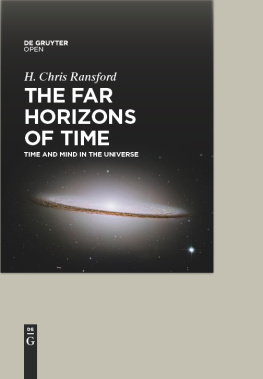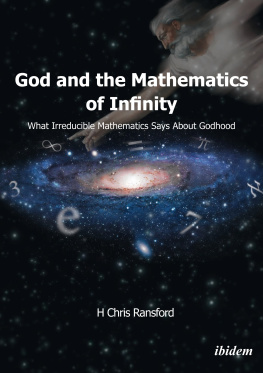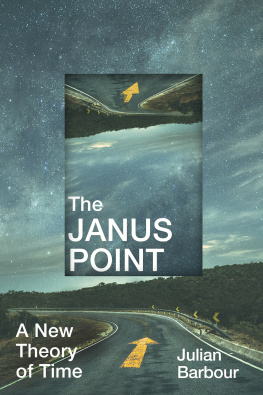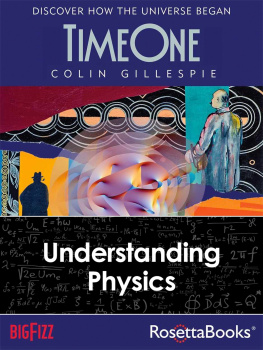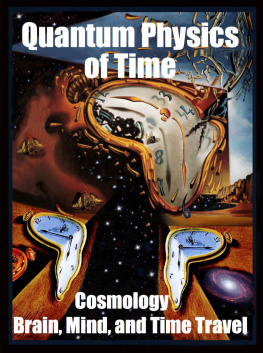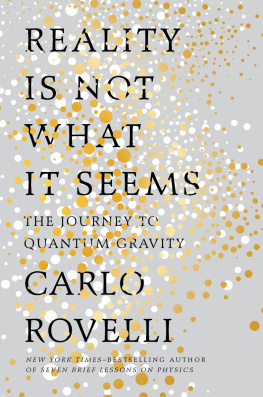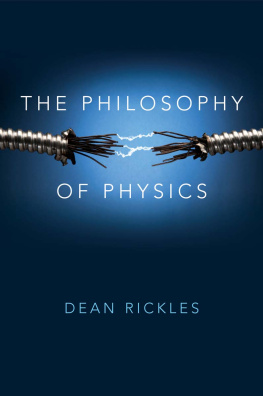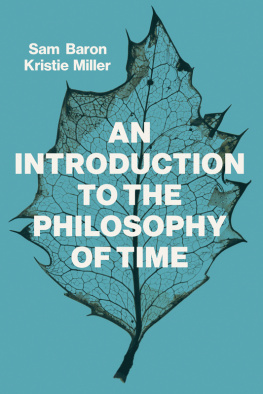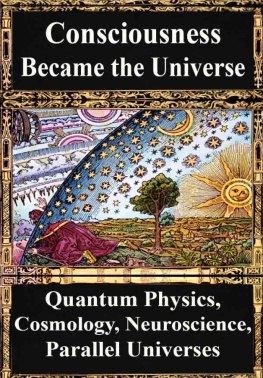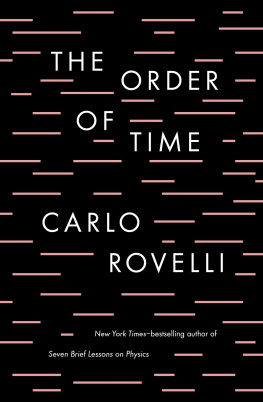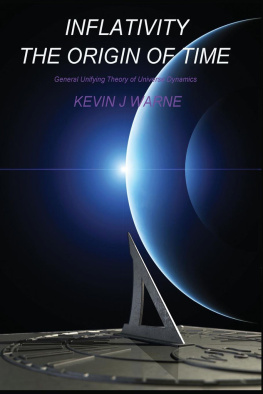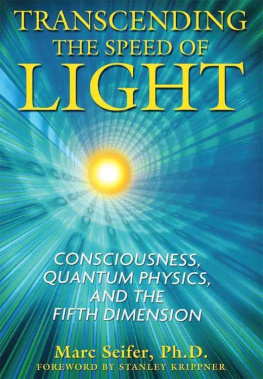Contents
H. Chris Ransford
The Far Horizons of Time
Time and Mind in the Universe
H. Chris Ransford
The Far Horizons of Time
Time and Mind in the Universe

Managing Editor: Paulina Lena-Szreter
Language Editor: Andrew Laister
Published by De Gruyter Open Ltd, Warsaw/Berlin
Part of Walter de Gruyter GmbH, Berlin/Munich/Boston

This work is licensed under the Creative Commons Attribution-NonCommercial-NoDerivs 3.0 license, which means that the text may be used for non-commercial purposes, provided credit is given to the author. For details go to http://creativecommons.org/licenses/by-nc-nd/3.0/.
Copyright 2014 H. Chris Ransford
ISBN 978-3-11-044027-0
e- ISBN 978-3-11-044028-7
Bibliographic information published by the Deutsche Nationalbibliothek
The Deutsche Nationalbibliothek lists this publication in the Deutsche Nationalbibliografie; detailed bibliographic data are available in the Internet at http://dnb.dnb.de.
Managing Editor: Paulina Lena-Szreter
Language Editor: Andrew Laister
www.degruyteropen.com
Cover illustration: Stocktrek Images
Acknowledgements & Thanks
First and foremost, I am indebted to Dr. Paulina Lesna-Szreter at de Gruyter Open who helped make a book out of a rather formless original manuscript, and whose advice was precious at every step of the way. I am also deeply indebted to all the teachers who ignited and then fed a thirst for always understanding what lies beneath, why is reality that way and not some other way. They are far too numerous to mention, and some have by now left us, but let me at least mention here Jean-Franois Guyot and Jean Besson in Grenoble, Klaus Tdheide in Karlsruhe, and Charles Joachain in Brussels.
There are also those who have written remarkable contributions in the form of books, articles or treatises and who, by doing so, have extended their influence well beyond their narrow confines of time and space. Some have been kind enough to occasionally correspond with me by email. For their kindness and discussions I am forever indebted to, among others, John D. Barrow, the late Evan Harris Walker, Dieter Zeh. Among those I did not correspond with but whose books and writings inspired me may I cite Stephen Hawking, Charles Joachain, Paul Davies, John Gribbin, Bernard dEspagnat, Claude Cohen-Tannoudji, all those whose names are cited in the index, and many others.
My deep gratefulness extends to my language editor, Andrew Laister, my esteemed friends and colleagues, Jean Franois Lacoste-Bourgeacq, Jean Bornarel, Bodil Jnsson, France Citrini, Andrew Greentree, Ulrich Mutze, Joachim Kalden, Claus Janew, Issam Sinjab, David Johnson, Daniel Peterson, Ben Thomas, Luciano Cassata, Jacques de Schryver, Charles Hirlimann, Johannes Grnwald, Andrzej Szymanski, Frank Volke, Muhammad Farooq, Erkki Brndas, Jean Claude Dutailly, Abedallah Rababah, Sergio Wechsler, Fethi Belgacem, Costas Drossos, H.E. Lehtihet, Hemanta Baruah, Mohammad Ayaz Ahmad, Vitaly Voloshin, Michael Brckner, Anatolij Prykarpatski, Yuri Gornostyrev, Octav Olteanu, Dmitry Kazansky, Abderrahmane Kadri, Nageswara Posinasetti, and countless others far too numerous to mention, some of whom I may only have interacted with electronically, but who have all proved stimulating, challenging, and enlightening. Of course, the ideas presented herein are mine, and discussion partners may have held different views.
Second - therein lies a tale. One of my earliest memories is a class at primary school - it had to be primary one, because thats when they teach about time and clocks. The teacher, a kind old man - although any man at any age must have looked positively ancient to us youngsters - was telling us about the time and its subdivisions, an hour, a minute, a second, and how they were clearly marked on the faces of our then exclusively analog watches.
He then volunteered a pretty odd comment which instantly indelibly etched itself on my young impressionable mind.
I still see him, wistfully peering at the bleak outside weather lashing the classrooms window panes with rain, when he mused half aloud, probably more to himself than to us: Some people say that there exists a sixtieth of a second too, but thats just much too small - it does not exist.
This odd pronouncement puzzled me endlessly, and the manifold questions arising from trying to make sense of it just wouldnt leave me alone. We were also then learning about distance and I recall thinking that if I ran as fast as I could across the schoolyard, then a sixtieth of a second or perhaps even less would be the time it would take to maybe move by an inch or less. I also remember thinking that if we kept adding up enough however small fractions of an inch, then we would inescapably end up with the yards full measure - and then some, and that in order to run the length of the yard I had to run those small distances first, in whatever time it took to do so - much certainly less than a sixtieth of a second each. The more I thought about it, the less this pronouncement seemed to make any sense at all.
Then time passed and I learnt about calculus - i.e., adding an infinitely large number of infinitely small things - and then even about languages: whereas there is no formal word in English for a sixtieth of a second exactly - a number of words, such as a jiffy, have been proposed but somehow never jelled - a number of other languages, such as both German and French, do have a definite word for it. Thus, my old teachers pronouncement appeared doubly wrong - a sixtieth of a second did exist after all, it wasnt too tiny, and adding up very many vanishingly small things did yield up measurable, ordinary, tangible outcomes.
And yet - because time is almost certainly discontinuous in our universe, the old teachers pronouncement was, in its essence, not so wide off the mark - albeit wrong by many orders of magnitude as to the actual measurement value of a time quantum. My kind old teacher, who set me wondering about time early on and whose name I now cannot ever hope to recall, rates a special acknowledgement here.
Last but not least ... the readers, who by reading science books demonstrate that the spirit of enquiry is alive and well, and that a society that keeps asking questions and investigating themes well beyond immediately utilitarian ones is a society that enhances human experience, as such eminently worth living in.
Introduction
This book is about Time. The mystery of what time actually is leads perfectly sane people to insist that time cannot possibly exist and is nothing but an abiding illusion. Others offer starkly contradictory theories as to what time actually is.
Trying to understand time, we must soon drill down ever deeper into the nature of reality itself, for time simply cannot be apprehended on its own. To understand time, it turns out that we have to understand wider reality, of which time is but one component. This quest ultimately leads to unexpected conclusions, which will be explored in this book. During this exploration, further questions will inevitably arise. Understanding the nature of time demands that we first apprehend the context in which it plays out that we delve into the very weft and fabric of reality itself. We will on occasion find that some of the questions we ask have a way of shifting and reappearing elsewhere rather than simply resolving themselves.

